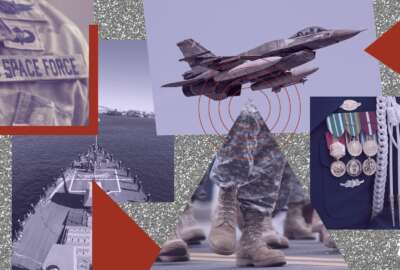Top researcher says Space Force needs more balanced strategy to deliver short term results
Congress is concerned that after nearly two years the Space Force doesn't have much to show.
The Space Force is taking a lot of flak from Congress for not producing expected results, especially considering the service has been around for nearly two years.
The Air Force Research Laboratory Space Vehicles Directorate director is advocating for a more balanced architecture for investment and planning in order to not only tackle long-term problems, but also deliver short-term results.
“I am disappointed at the pace at which we’ve been able to move to a more resilient space architecture, but there are a lot of factors to consider and we are not just starting — from nothing,” said Col. Eric Felt during a Tuesday National Security Space Association event. “We’re starting from some great capabilities that we have today. There’s a lot of thought that needs to go into how do you evolve those into the future.”
Felt said it is his job to show people in the military that it is not frightening to do new, innovative things.
“We have to do this new stuff if we want to stay ahead of our competition and make sure that our space capabilities are there — when we need them the most and when our warfighters need them the most,” Felt said. “I think that my role in accelerating change is to burn down the technical risks and show that we actually can do some of these future things proliferate.”
Felt pointed to LEO, using commercial broadband services from low-earth orbit, as a good example of how the Space Force is using its status as a small military branch to embrace taking risk.
The Space Force put its latest request for information out for LEO in March.
Felt added that the Space Warfare Analysis Center is helping the Space Force navigate its way through complex risk choices.
“The function is extremely important in being able to make data driven decisions on what is the best future architecture to enhance the resilience and remain agile to respond to these unexpected threats,” he said.
Congress, which legally created the Space Force, has been disappointed in the service’s speed in acquisition.
“I thought the new Space Force and the revival of the old Space Command were supposed to give America better options,” Rep. Jim Cooper (D-Tenn.), and chairman of the House Armed Services Strategic Forces Subcommittee, wrote in a recent opinion piece in War on the Rocks. “The clock is ticking because the United States has been inviting an orbital Pearl Harbor for decades.”
The House Appropriations Committee is also getting impatient.
“The committee remains concerned that the Air Force has not taken more aggressive action in addressing longstanding space acquisition issues and has made little progress in defining what the Space Force will be doing that is fundamentally different than when it was a component of the Air Force,” the members of the committee wrote. “The Space Force lacks a clear plan which defines its future space architecture and lacks a strategy for how this architecture will be acquired.”
One of the committee’s main concerns revolves around Space Systems Command, which is in charge of the acquisition and fielding of space equipment.
“The plans for establishing the new acquisition unit, Space Systems Command, consist primarily of renaming the Space and Missile Systems Center and incorporating existing space launch units,” the lawmakers wrote. “The plan does not resolve the fundamental issues of overlap and duplication in roles, responsibilities and authorities among the various other space acquisition units in the Department of the Air Force.”
The lawmakers are pushing the Air Force to find a space acquisition professional to serve as the assistant secretary of the Air Force for space acquisition and integration as soon as possible and to move authority to that position.
The law requires that the position be created and filled by October 2022. However, there are still questions over what the role would look like.
Copyright © 2024 Federal News Network. All rights reserved. This website is not intended for users located within the European Economic Area.
Scott Maucione is a defense reporter for Federal News Network and reports on human capital, workforce and the Defense Department at-large.
Follow @smaucioneWFED






